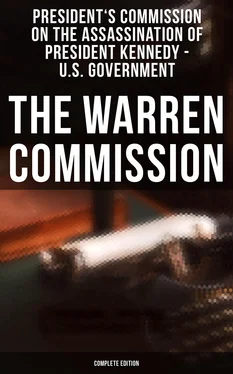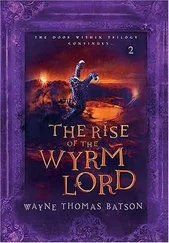Mr. McKenzie. The home itself was located in New Orleans, is that correct?
Mr. Oswald. That is correct.
Mr. Jenner. In the city proper, rather than a suburb?
Mr. Oswald. I would say that was so, sir. I still recall that it was pretty close to the end of the St. Charles Street carline at that particular time.
My recollection of the atmosphere and the general conditions there—it was nice, I had a lot of friends there at the home. It was a Christian atmosphere.
Going back to the Catholic school—we had to go to church every morning and so forth like that.
But here at the tables and so forth we had our grace and such as that. It was generally a Christian atmosphere there. He treated us well, I might add—better than the Catholic school did. They were not as strict as far as discipline was concerned, but they certainly kept us in line.
Mr. Dulles. Could I ask a question there?
Was this a denominational school, or a publicly maintained school?
Mr. Oswald. I don't believe it was a denominational school. I believe it was a public—I feel it was a private school or home. But that the religious background did not have anything to do with it. It might have been just a Protestant home.
Mr. Jenner. I am curious, if I may, Mr. Dulles—the name of this school or home is the Bethlehem Orphan Home. But neither of you boys was an orphan.
Mr. Oswald. No, sir.
Mr. Jenner. I take it, then, that apart from the name of the school, there were orphans and young people, children such as you, whose mothers, or perhaps fathers, were unable to take care of them during the daytime completely, and the school accepted children under those circumstances.
Mr. Oswald. Yes, sir; that is my understanding.
Mr. Jenner. Therefore, it was not exclusively for orphans?
Mr. Oswald. No, sir.
Mr. Dulles. I think I have read somewhere—I would like to ask, if I may—I understand there had to be only one parent, though. I don't think if you had two parents you were eligible for this school. I don't know where I read that, but I recollect that.
Is that the case, do you remember?
Mr. Oswald. My recollection on that, sir, was that I do recall mother saying something that there was a little difficulty in placing us in there, because we were not orphans. But that they had from time to time made exceptions to this, where one parent was living and unable to attend the children fully during the day and so forth, and even at night.
Mr. Jenner. Now, you entered in 1942. Did you and John continue in this school—for what period of time?
Mr. Oswald. Until we moved to Dallas, in 1944, sir.
Mr. Jenner. Before we get to that, has Mr. Oswald responded to the questions you had in mind, to describe the nature of the school?
Mr. Dulles. Yes.
Mr. Jenner. Were you visited by your mother and Lee to the extent that she brought him along, when you and John were in the Bethlehem Orphan Home?
Mr. Oswald. Yes, sir; we were. I do recall quite vividly that on Wednesdays—this perhaps might have been during the summer months only—that John and I would go to downtown New Orleans and meet mother at her place of employment, and either spend the afternoon with her, or she would give us money to go to a movie or something. And at this time mother was employed as a manager or assistant manager of a hosiery shop located on Canal Street. I don't recall the name of it, or the exact address of it.
Mr. Jenner. Would you be good enough to inform the Commission to the best of your recollection about weekends? Did your mother visit you on weekends? Were you free to return home and spend the weekend? Describe that, please.
Mr. Oswald. I do not recall on the weekends—a weekend, I should say, that we visited mother. Normally, we just saw her once a week at that particular time. I do not recall—I have been thinking about this—seeing Lee too often at that time.
Mr. Jenner. You and John would be naturally curious to see him once in awhile?
Mr. Oswald. Yes, sir; I know we did. I cannot remember it too clearly.
But I would say that it wasn't too frequently that we did see Lee.
Mr. Jenner. Now, you moved to Dallas in 1944?
Mr. Oswald. That is correct.
Mr. Jenner. Was there anything unusual prior to the time you moved to Dallas about your life and your relationships with your mother and with Lee, if any? Was there an event that is now etched on your mind?
Mr. Oswald. I would like to back up there just a little bit.
Lee was placed at the Bethlehem Orphan Home for approximately the last year that we were there.
Mr. Jenner. That would be, then, 1943?
Mr. Oswald. Yes, sir.
Mr. Jenner. I see.
Mr. Dulles. He would have been 4 to 5 years old then?
Mr. Jenner. Yes. He was born in October 1939. So he would then be approximately 4—well, when he was placed in Bethlehem Home it was some time during the year 1943, to the best of your recollection?
Mr. Oswald. Yes, sir.
Mr. Jenner. Would you be good enough to relate to the Commission the circumstances that brought that about? What do you recall as to why?
Mr. Oswald. My opinion on that, sir, was this. That mother had wanted to bring Lee to the home at an earlier date, but that they had a minimum age required before he could be placed in there, because they did not have any real small children there. I mean there was no nursery there that I recall. And there was no very young children. When I say very young—say under 3 years old.
I remember some children there that perhaps were four or three and a half years old.
Mr. Jenner. I take it, Mr. Oswald, your mother put Lee in the orphan home at the first opportunity open to her under the rules or policy of the Bethlehem Orphan Home in that respect.
Mr. Oswald. That is correct.
Mr. Jenner. Now, did she come to visit the home when Lee was placed in the home?
If I may, you recall you said you were free on Wednesdays, it may have been limited to the summer time, and you and John would go into the New Orleans town district and visit your mother.
Did she come to see Lee? Does that stimulate your recollection that she did come to visit?
Mr. Oswald. Yes, sir; she did come to visit us. I recall after Lee was placed in the home, that all three of us would go down and visit mother, and we always took Lee with us.
Mr. Jenner. I see. What contact did you have with Lee in that 1-year period, in 1943, when he was with you boys in the home?
Mr. Oswald. John and I both looked on Lee as our kid brother, and we stayed pretty close to him, and defended him whenever we had to.
Mr. Jenner. How did Lee get along during those days?
Let's confine it to up to 1944, when you moved to Dallas.
Mr. Oswald. I don't recall any instance where it would stand out in my mind that he did not get along with anybody.
Mr. Jenner. He had the normal life of a 4-year-old at that particular time—got into his fights to the extent everyone else did?
Mr. Oswald. Yes, sir.
Mr. McKenzie. You mean at the time he was 4 years old?
Mr. Oswald. Yes, sir.
Mr. Jenner. There may be others who would be interested in his course of conduct and his reactions even at age 4. You will forgive me for going into that.
Mr. Oswald. Certainly.
Mr. Jenner. But your present recollection, as far as Lee's relationship with other 4-year-olds or 5's or 3's, his general course of conduct, with regard to the interplay between himself and others at or near his age, is what you would describe as normal?
Mr. Oswald. Yes, sir; that is correct.
Mr. Jenner. All right.
Now we are moving to Dallas in 1944. You brought out the fact that Lee became enrolled in Bethlehem Orphan Home, because I asked you questions whether there was anything unusual etched on your mind at that time that had occurred up to the point of your moving to Dallas. Was there anything else that this discussion, that is now stimulated that you would like to report?
Читать дальше












